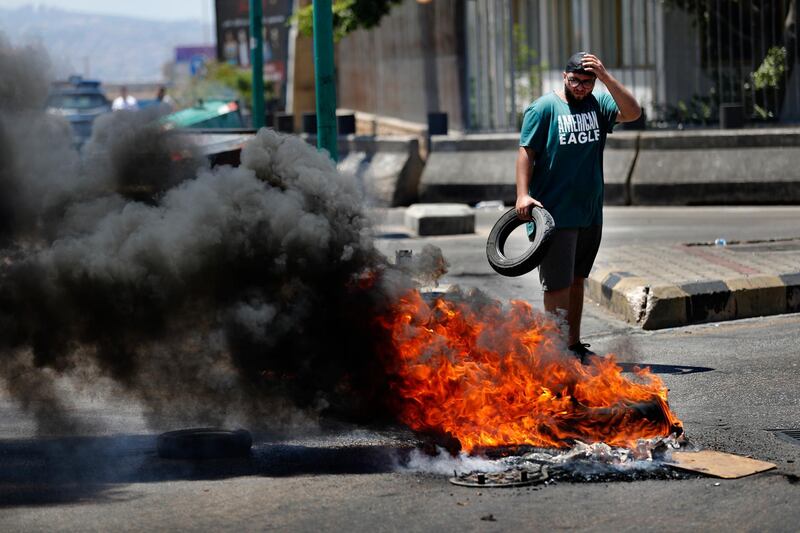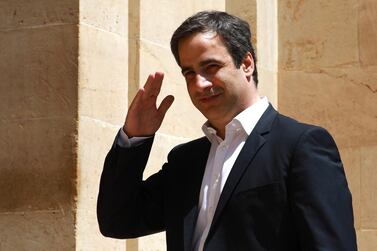Some Lebanese political parties and labour unions called for a one-day strike on Thursday to demand the formation of a government after eleven months of vacancy, but were dismissed by critics who derided them for protesting against their own lack of action.
Spoof photoshopped pictures of protesters throwing rocks in downtown Beirut, their faces replaced by Lebanese politicians and labour leaders, circulated widely on Twitter on Wednesday evening, poking fun at the idea of the protest.
السلطة تتظاهر ضد السلطة 😂😂🤣🤣#أغبياء_من_بلادي pic.twitter.com/TDwVZo7rzb
— Noura Turkemani | نورى تركماني (@terekmaninoura) June 16, 2021
Government critics said political parties calling for protests was galling as they have directly failed to form a government since last October because they cannot agree on how to allocate ministerial posts.
“The system is on strike against itself today” tweeted opposition politician Sami Gemayel.
المنظومة عاملة اضراب ضد نفسا اليوم، بينما أركانها عم يتصارعوا على صلاحيات مهرية ليثبتوا مين بدو يساهم بالافلاس أكتر من التاني.
— Samy Gemayel (@samygemayel) June 17, 2021
الرؤساء الثلاث مش عايشين عنفس الكوكب معنا!؟#السلطة_تنتفض!
Protesters on the ground denied that they were politicised but shied away from criticising political parties.
“They are trying to paint it as political parties participating in protests, but this is the pain of the Lebanese people,” said Kamel Yateem, head of the union of employees of the state-owned Regie tobacco company.
“We want the formation of a government. It’s the only solution to save the economy and the Lebanese people.”
Mr Yateem was participating in a sit-in with a few hundred people outside the headquarters of the General Confederation of Lebanese Workers in Beirut. The confederation called for a one-day nation-wide strike on Thursday, the second in the past month. This time, its call was backed by several prominent political parties.
Members of his union said representatives of only two political parties were present: the majority Shiite Muslim Amal movement, led by Parliament speaker Nabih Berri; and the Sunni Muslim Future Movement, led by prime minister designate Saad Hariri.
“It’s natural that their representatives are here because they are asking for a government to be formed. Some other parties are blocking it,” said Mirna Mneimeh, 46, referring to President Michel Aoun’s Free Patriot Movement.
Mr Hariri and Mr Berri have lately united to increase pressure on Mr Aoun in order to force him to make concessions.
But Ms Mneimeh said she was not protesting in the name of a political party. “We are the people. Not parties,” she said. “We are asking for our rights.”
A young man who simply gave his name as Baker harshly criticised Mr Aoun, calling him a “curse”. “I have one demand,” he said, standing close to burning tyres and garbage that had been thrown across a highway to cut traffic in a southern suburb of Beirut on Thursday morning. “It’s to be able to emigrate and have a future. In Lebanon there is no future.”
The Lebanese pound hit a new low last week at 15,150 per dollar, which is roughly ten times less than it was worth before the country’s economic collapse in 2019.
The worsening liquidity crisis has caused shortages in pharmacies, hospitals and petrol stations, with motorists queuing for hours to be able to buy a limited amount of fuel.
Nation-wide protests erupted across the country in October 2019 but petered out after political parties, headed by sectarian leaders in power for decades, pushed back.
A devastating explosion at Beirut’s port last August forced the resignation of the government, and the country has been without a functioning Cabinet since.
Marie-Noëlle Abi Yaghi, a professor at the Institute of Political Science at the Saint-Joseph University in Beirut, said the General Confederation of Lebanese Workers has been co-opted and manipulated by mainstream political actors for decades.
Thursday’s mobilisations aim to “reassert the status quo and the prevalence of existing power dynamics,” she said.
“The demand of government formation by the same political actors who are expected to form the said government, and who have been delaying this process for months in order to ensure more seats, could appear anecdotally funny if it weren't a tactical attempt to delocalise the negotiations to the streets,” she said.
Castro Abdallah, the head of a labour union that is not part of the General Confederation of Lebanese Workers, described Thursday’s protests as a part of the wider political struggle over the Cabinet’s formation.
“Sectarian powers are working together behind the scenes to stay in power,” he said.
“We also want a new government but one that is independent from current political parties, that works to save the country, to return the stolen money, and allows citizens to live in dignity,” he said.








